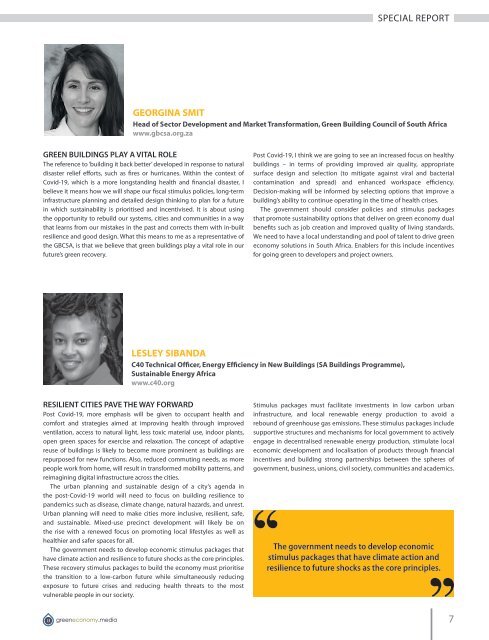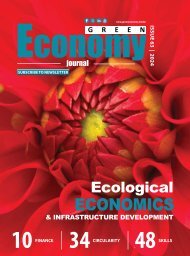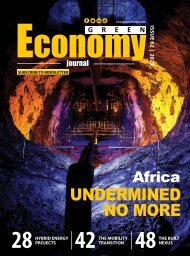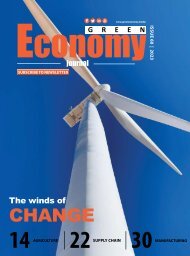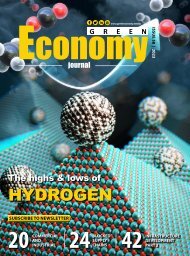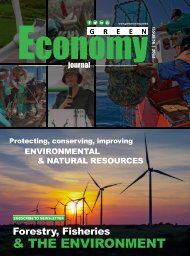Green Economy Journal Issue 41
Create successful ePaper yourself
Turn your PDF publications into a flip-book with our unique Google optimized e-Paper software.
SPECIAL REPORT<br />
Georgina Smit<br />
Head of Sector Development and Market Transformation, <strong>Green</strong> Building Council of South Africa<br />
www.gbcsa.org.za<br />
GREEN BUILDINGS PLAY A VITAL ROLE<br />
The reference to ‘building it back better’ developed in response to natural<br />
disaster relief efforts, such as fires or hurricanes. Within the context of<br />
Covid-19, which is a more longstanding health and financial disaster, I<br />
believe it means how we will shape our fiscal stimulus policies, long-term<br />
infrastructure planning and detailed design thinking to plan for a future<br />
in which sustainability is prioritised and incentivised. It is about using<br />
the opportunity to rebuild our systems, cities and communities in a way<br />
that learns from our mistakes in the past and corrects them with in-built<br />
resilience and good design. What this means to me as a representative of<br />
the GBCSA, is that we believe that green buildings play a vital role in our<br />
future’s green recovery.<br />
Post Covid-19, I think we are going to see an increased focus on healthy<br />
buildings – in terms of providing improved air quality, appropriate<br />
surface design and selection (to mitigate against viral and bacterial<br />
contamination and spread) and enhanced workspace efficiency.<br />
Decision-making will be informed by selecting options that improve a<br />
building’s ability to continue operating in the time of health crises.<br />
The government should consider policies and stimulus packages<br />
that promote sustainability options that deliver on green economy dual<br />
benefits such as job creation and improved quality of living standards.<br />
We need to have a local understanding and pool of talent to drive green<br />
economy solutions in South Africa. Enablers for this include incentives<br />
for going green to developers and project owners.<br />
Lesley Sibanda<br />
C40 Technical Officer, Energy Efficiency in New Buildings (SA Buildings Programme),<br />
Sustainable Energy Africa<br />
www.c40.org<br />
RESILIENT CITIES PAVE THE WAY FORWARD<br />
Post Covid-19, more emphasis will be given to occupant health and<br />
comfort and strategies aimed at improving health through improved<br />
ventilation, access to natural light, less toxic material use, indoor plants,<br />
open green spaces for exercise and relaxation. The concept of adaptive<br />
reuse of buildings is likely to become more prominent as buildings are<br />
repurposed for new functions. Also, reduced commuting needs, as more<br />
people work from home, will result in transformed mobility patterns, and<br />
reimagining digital infrastructure across the cities.<br />
The urban planning and sustainable design of a city’s agenda in<br />
the post-Covid-19 world will need to focus on building resilience to<br />
pandemics such as disease, climate change, natural hazards, and unrest.<br />
Urban planning will need to make cities more inclusive, resilient, safe,<br />
and sustainable. Mixed-use precinct development will likely be on<br />
the rise with a renewed focus on promoting local lifestyles as well as<br />
healthier and safer spaces for all.<br />
The government needs to develop economic stimulus packages that<br />
have climate action and resilience to future shocks as the core principles.<br />
These recovery stimulus packages to build the economy must prioritise<br />
the transition to a low-carbon future while simultaneously reducing<br />
exposure to future crises and reducing health threats to the most<br />
vulnerable people in our society.<br />
greeneconomy.media<br />
Stimulus packages must facilitate investments in low carbon urban<br />
infrastructure, and local renewable energy production to avoid a<br />
rebound of greenhouse gas emissions. These stimulus packages include<br />
supportive structures and mechanisms for local government to actively<br />
engage in decentralised renewable energy production, stimulate local<br />
economic development and localisation of products through financial<br />
incentives and building strong partnerships between the spheres of<br />
government, business, unions, civil society, communities and academics.<br />
The government needs to develop economic<br />
stimulus packages that have climate action and<br />
resilience to future shocks as the core principles.<br />
7


